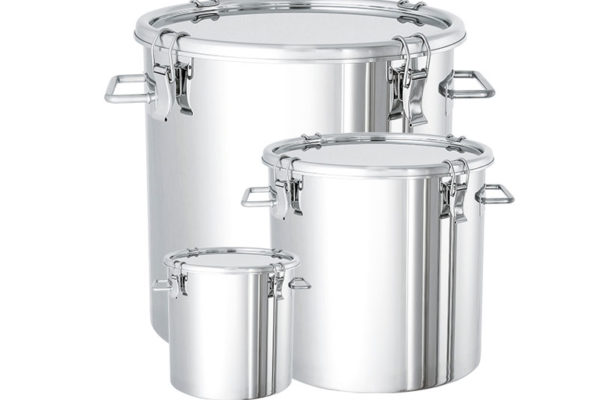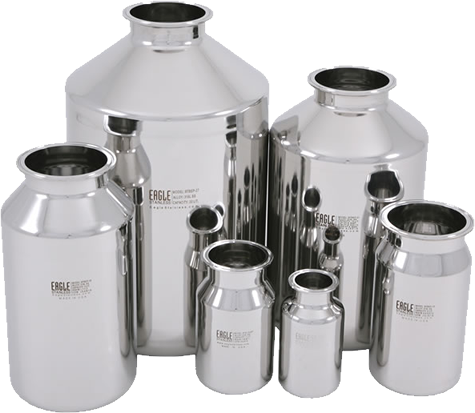Stainless steel comes in a wide range of offerings, grouped into series and grades. The best grade of stainless steel for industrial use depends on its intended purpose. Though the stainless steel used in the pharmaceutical industry and in your car’s engine share some common features, they’re not the same.
For example, the 400 series contains some of the strongest stainless steel grades, thanks to high carbon and low nickel content. It’s often used for equipment that will experience heavy grinding and friction, such as motors and farm machinery.
The 300 series, on the other hand, is more resistant to pitting and corrosion when exposed to chemicals, salts, or extreme temperatures. It also has low reactivity with products. For settings where corroding elements are a factor or storing food, medicine, or other sensitive products, an industry usually needs food grade or medical grade stainless steel from the 300 series.
Stainless steel quality is also important. Eagle Stainless’ high-quality stainless steel products with superior welds, are polished to a smooth surface finish and have radiused corners to prevent corrosion and contamination. Features such as electropolishing and passivation improve the finish even further.

What do we use stainless steel for?
Stainless steel is all around us, in every room of the house, and in all aspects of life, from personal items to large scale materials – tools, food storage, appliances, vehicles, medical equipment, residential and commercial construction, and more.
But stainless steel’s largest role happens before products reach consumers, during medical and industrial testing, manufacturing, storing, and transportation processes. Many major industries, such as the food and beverage, pharma and biotech, and cannabis industries, rely on stainless steel for all phases of product development through delivery.
Eagle Stainless’ steel process tanks, pressure vessels, storage containers, transportation containers, bottles, beakers, ladles, reducers, end caps, hose barbs, clamps, stability bottles, and sight glasses are some of the products used in these industries.
Benefits of stainless steel
Stainless steel plays such a significant part in industry for a good reason. Stainless steel, especially medical grade stainless steel, offers many benefits, including:
- Exceptional formability during production
- Resistance to corrosion and pitting
- Low reactivity to temperatures and chemicals, including salts
- Long-lasting durability
- Easy-to-clean and sanitize smooth surfaces
- Recyclable and reusable
- Traceability

Importance of stainless steel in pharmaceutical industry
Stainless steel helps the pharmaceutical and biomedical industries maintain high standards and meet strict requirements. The specific types of stainless steel used in these industries may be referred to interchangeably as pharmaceutical, medical or surgical grade stainless steel.
Pharmaceutical grade stainless steel composition consists of austenitic stainless steel, which includes metals such as nickel and molybdenum added to the iron, carbon, and chromium. This improves resistance to chemicals and corrosion. This type of steel is also heat resistant, allowing for frequent sanitation by either chemical cleaning or heat. This gives pharmaceutical grade stainless steel an obvious advantage over other materials, since equipment must be frequently sterilized. The smooth, unpitted surface also helps prevent contamination. Pharmaceutical equipment manufacturers most commonly use 316L stainless steel. This steel also has low reactivity with chemicals, making it the best choice for storing or processing pharmaceutical products and the preferred material for pharmaceutical tank manufacturers.
Food safe stainless steel
Food manufacturing and storage must meet many of the same high standards as the pharmaceutical industry for consumers’ safety, which means that food quality stainless steel also must be corrosion resistant, resistant to microbial growth due to a smooth surface, easy to sanitize, and non-reactive with the materials it holds.
What grade of stainless steel is food grade? Food grade stainless steel usually refers to grades 316 or 304. One attribute of the 300 series that is especially important for food is its resistance to salts and acids, which are common ingredients in foods. However, grade 430 is also sometimes used. It is not as resistant to salts but does have a higher resistance to certain types of acid, and it’s usually less expensive than steel from the 300 series. So, the answer to what is the best food grade stainless steel can depend on ingredients of the food that is being manufactured or stored.
Stainless steel containers in cannabis
Since cannabis containers come in contact with products that will be consumed through eating or smoking or used in direct contact with skin in soaps and lotions, the stainless steel used in the cannabis industry has to be just as high-quality as what’s used in traditional food and pharmaceutical industries. This is especially true as medical cannabis use increases.
For this reason, the non-reactivity of stainless steel is a significant benefit in vessels for cannabis. Stainless Steel also helps to maintain environmental stability. It’s a non-absorbent material that blocks out moisture and its smooth surface tends to resist growth of bacteria and other organisms.
Traceability is another factor that, while important for all industries involving consumables, is especially important in the cannabis industry. As a newly legalized and extremely profitable product in most states, it’s closely regulated from seed to sale. The CBD tanks and THC tanks that store cannabis and cannabis products also must be easily tracked, since maintenance and sanitization of the containers, as well as what product is stored in them, is tightly regulated. Stainless steel can be easily engraved for tracking purposes.
Stainless steel cosmetic containers
The low reactivity and corrosion resistance of stainless steel also make it an excellent vessel choice for industrial cosmetic containers for both manufacturing and bulk storage. Stainless steel containers can be easily cleaned and reused after product is transferred to consumer packaging, making stainless steel an environmentally friendly choice as well as a cost-effective one. Since stainless steel is a low reactor and won’t absorb products, it won’t corrode from the chemicals in cosmetics or alter the composition of the product. This protects both consumer safety and aesthetic satisfaction.
Buy stainless steel containers
When buying stainless steel containers, here’s some things to consider:
- What’s the intended purpose or purposes of your industry? How will you be using the containers or equipment? What products will the stainless steel come in contact with? Which series and grade best meet your needs? Will the containers need to be traced and monitored?
- What’s your budget and scale? Do you have small, standardized needs that might be met with stainless steel pressure vessels or containers? Can you save by buying in bulk? Or do you need customized fabrication or a personalized, small-scale order?
- Can the stainless steel manufacturers you’re considering offer the quality and grade of stainless steel that you need with material certificates? Do they provide electropolishing and smooth radiused interiors for a micro-smooth finish and increased durability? Are they willing to work with you on extra large bulk orders or extra small scale production orders? Will they include engraving as part of the service? Do they have fabrication plans available for you to browse or engineers on hand to create customized designs and CAD drawings?
For a stainless steel manufacturer who can help you answer these questions and provide all these services, contact Eagle Stainless.
